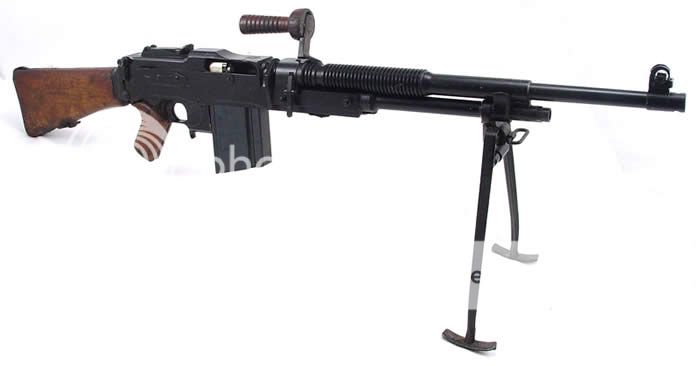Small Arms of the Republic of China Military, 1925-1960:
Major Arsenals:
-Taiyuan Arsenal (Founded 1912)
-Hanyang Arsenal (Founded 1891)
-Chongqing Arsenal (Founded 1929)
-North China State Industrial Manufacturing Corporation (Norinco) (Founded, 1948)
Pistols:
-Type 24 Pistol (M1911A1)
-Type 17 Pistol (Mauser C96 in .45 Remington-Thompson)
-Type 38 Pistol (Browning Hi-Power in .45ACP)
Submachine Guns:
-Type 21 Submachine Gun (M1928 Thompson in .45 Remington-Thompson)
-Type 39 Submachine Gun (Proprietary, similar to PPSh-41)
Shotguns:
-Type 27 Shotgun (Winchester 1897 clone)
Rifles:
-Type 24 Rifle (Modified Mauser 1888)
-Type 29 Rifle (Proprietary Design, ZH-29 Based)
-Type 22 Light Machine Gun (Browning Automatic Rifle)
-Type 53 Assault Rifle (Proprietary)
-Type 36 Anti-Tank Rifle (Mauser T-Gewehr in 12.7x99mm)
Machine Guns:
-Type 34 Medium Machine Gun (MG-34)
-Type 40 Medium Machine Gun (Modified, cheaper MG-34)
-Type 24 Heavy Machine Gun (MG08)
-Type 33 Heavy Machine Gun (M2HB)
Grenades:
-Type 24 (Crude fragmentation grenade adaptable as rifle grenade)
-Type 36 (Anti-Tank Grenade)
-Type 57 (Rocket assisted rifle grenade)
Anti-Tank Weapons:
-Type 39 "Fire Lance" Disposable Anti-Tank Rocket (Not quite a Panzerfaust, see upcoming writeup)
-Type 43 Bazooka (M1 Bazooka)
-Type 48 Bazooka (M9 Bazooka)
-Type 45 Recoilless Rifle (M18 Recoilless Rifle)
-Type 55 Fire Lance II Disposable Anti-Tank Rocket
-Type 57 Rocket Propelled Grenade
Major Arsenals:
-Taiyuan Arsenal (Founded 1912)
-Hanyang Arsenal (Founded 1891)
-Chongqing Arsenal (Founded 1929)
-North China State Industrial Manufacturing Corporation (Norinco) (Founded, 1948)
Pistols:
-Type 24 Pistol (M1911A1)
-Type 17 Pistol (Mauser C96 in .45 Remington-Thompson)
-Type 38 Pistol (Browning Hi-Power in .45ACP)
Submachine Guns:
-Type 21 Submachine Gun (M1928 Thompson in .45 Remington-Thompson)
-Type 39 Submachine Gun (Proprietary, similar to PPSh-41)
Shotguns:
-Type 27 Shotgun (Winchester 1897 clone)
Rifles:
-Type 24 Rifle (Modified Mauser 1888)
-Type 29 Rifle (Proprietary Design, ZH-29 Based)
-Type 22 Light Machine Gun (Browning Automatic Rifle)
-Type 53 Assault Rifle (Proprietary)
-Type 36 Anti-Tank Rifle (Mauser T-Gewehr in 12.7x99mm)
Machine Guns:
-Type 34 Medium Machine Gun (MG-34)
-Type 40 Medium Machine Gun (Modified, cheaper MG-34)
-Type 24 Heavy Machine Gun (MG08)
-Type 33 Heavy Machine Gun (M2HB)
Grenades:
-Type 24 (Crude fragmentation grenade adaptable as rifle grenade)
-Type 36 (Anti-Tank Grenade)
-Type 57 (Rocket assisted rifle grenade)
Anti-Tank Weapons:
-Type 39 "Fire Lance" Disposable Anti-Tank Rocket (Not quite a Panzerfaust, see upcoming writeup)
-Type 43 Bazooka (M1 Bazooka)
-Type 48 Bazooka (M9 Bazooka)
-Type 45 Recoilless Rifle (M18 Recoilless Rifle)
-Type 55 Fire Lance II Disposable Anti-Tank Rocket
-Type 57 Rocket Propelled Grenade
